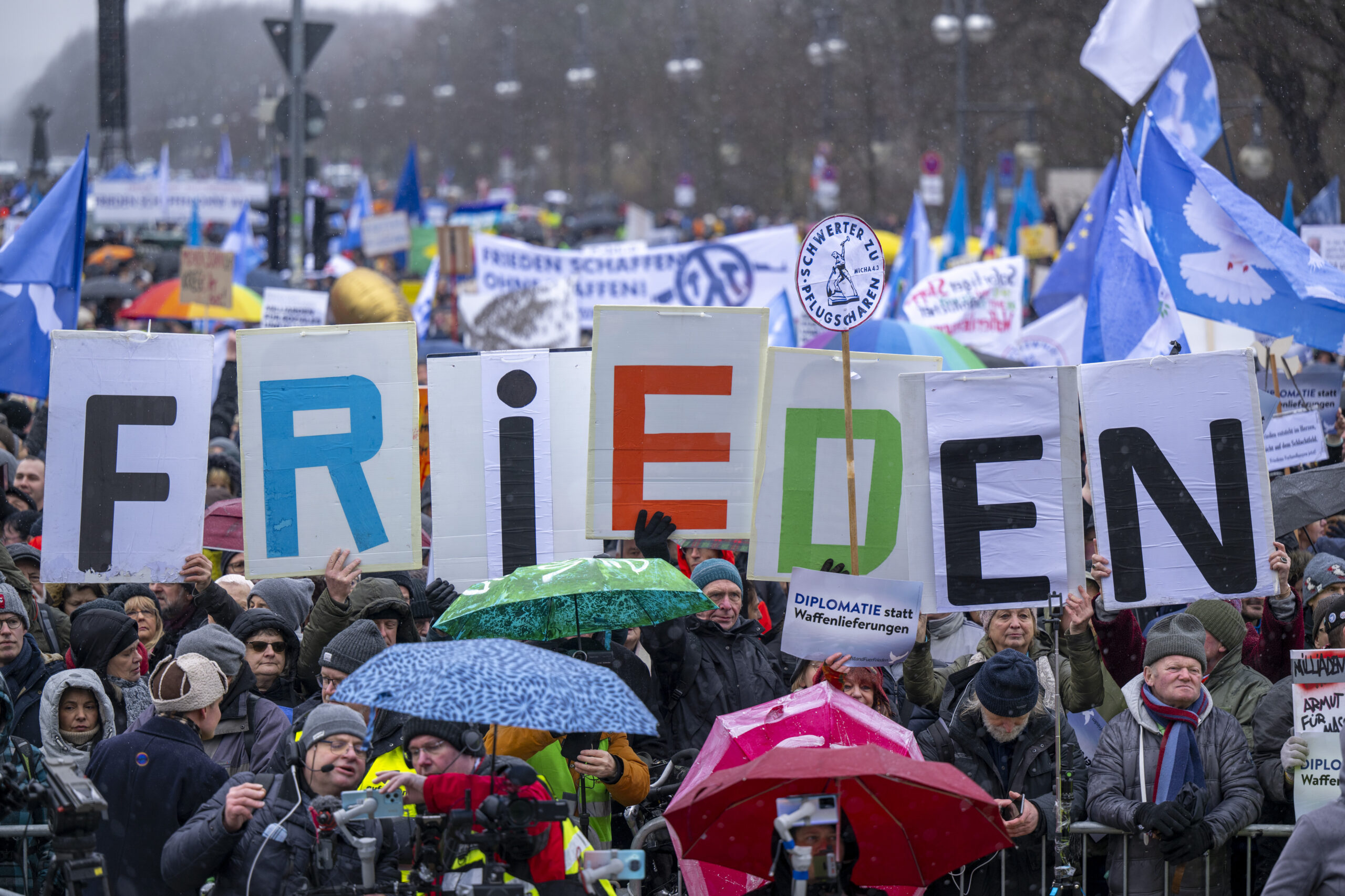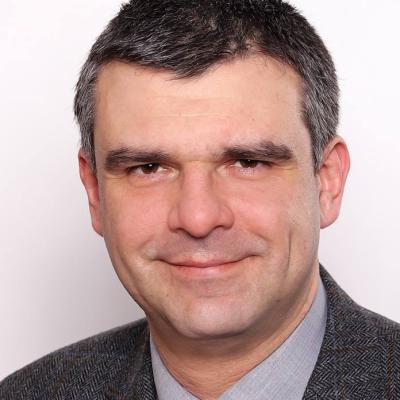After the start of the full-scale Russian invasion of Ukraine, a fierce debate began in Germany about how to react. Empathy, solidarity with Ukraine and a fundamental readiness to support it were expressed by all significant German officials; yet the debate around any supply of weapons and options for a peaceful settlement soon became controversial. In this discussion, the focus remains on German pacifists, who are now severely criticized. Some commentators have marked «the end of unconditional pacifism», or speak of its «suicidal tendencies», and predict it a place «in the dustbin of history». Others call for «showing responsibility» and finding a new formula that excludes both the «old pacifism» and militarism.
Evolution of the pacifist movement
The roots of the mass pacifist movement in West Germany (the Friedensbewegung) dates back to the 1950s. The impetus was the debate about the role of West Germany in the context of the Coñd War. The country, according to many, had too hastily joined NATO in 1955, and three years later the Bundestag decided to deploy American nuclear weapons. In all major cities, informal networks of anti-militarists arose, uniting leftists, liberals, intellectuals, church leaders and anti-fascist organizations. Soon enough, Germany’s pacifists became the main socio-political force that advocated a different concept for the development of the Federal Republic. And strengthening that position further was the ban on the Communist Party of Germany (KPD), which had managed to collect almost six million signatures under an appeal against remilitarization. Pacifists also gained ground from the intransigence of the CDU and the extremely cautious position of the SPD.
An activist of those years, writer Hans Werner Richter noted the popularity of the movement under slogans like «Without me!» and «No death in an atomic fire!» He famously said: «Professors, writers, directors, actors, journalists protested. Practically the whole of spiritual Germany protested, in unity, more united than ever before». Major political figures were involved in the orbit of pacifism. Gustav Heinemann, for instance, who resigned as Konrad Adenauer’s Interior Minister in protest against the arms race. The April «Easter Marches» (up to 300,000 participants) were born at around this time too, and remain the main annual rally for German pacifists. It intertwined with student protests in the 1960s, aimed at changing the politics of memory and accepting responsibility for the Nazi crimes of the entire German people. In this way the peace movement — which had established stable international contacts based on resistance to the Vietnam War — was transformed into one of the main driving forces that forever changed the social climate in Germany.
It received partial formalization in the form of the Extra-Parliamentary Opposition (APO), which became the cradle for new parties, primarily the Greens. Protests against the deployment of American medium-range missiles in Western Europe and the development of neutron weapons gave new impetus to German pacifism. Historian Philipp Gassert notes: «The peace movement of the 1980s reached the highest level of protest mobilization in the history of the ‘old FRG’. More people took to the streets than at any time since 1949.» Contrary to popular belief, German pacifism concentrated not only on criticism of Western realities. At the demonstrations and in the speeches of activists, there were (albeit in a much smaller volume) words of protest against the Soviet invasion of Afghanistan in 1979, the aggressive policy of the USSR and its satellites, as well as the adoption of ever new types of weapons of mass destruction, both in the West and in the East. In the conditions of the 80s, new topics were added to the traditional anti-war agenda: environmental protection and the rejection of nuclear power plants.
Identity Crisis
The end of the 20th century was a triumph for the German peace movement. The Cold War ended. The US and the USSR signed agreements on radical reductions in nuclear weapons. Germany united, as many pacifists had demanded, and made peacekeeping a diplomatic priority. Environmental issues have become an integral part of the programs of almost all political parties, and the decision to abandon nuclear energy was supported even by conservative forces represented by the CDU during Angela Merkel’s chancellorship. Yet in the 21st century, humanity has not stopped waging war. NATO’s operation against Yugoslavia in 1999 and the US war against Iraq in 2003 caused a temporary surge in the popularity of German pacifists. In February 2003, up to half a million people took to the streets of Berlin. The press called this protest «the largest demonstration for peace in the history of Germany.» Easter marches continued, significant organizations continued to function, the pacifist agenda enjoyed the support of the Germans. But, in general, the pacifists began to lose broad political influence. Quite often, any criticism of NATO and the United States as the world’s leading military power resulted in anti-Americanism. Criticism of Israel’s actions led to dubious alliances with groups close to anti-Semitism that denied freedom and democracy. This stimulated a split in the pacifist movement. Those who protested together in the 1980s, and their children, no longer wanted to stand together at the same demonstration. Extreme views alienated more moderate supporters and splintered cohesion.
Russian war against Ukraine: a stumbling block
February 24, 2022 will undoubtedly go down in the history of German pacifism as the final split within the movement. Russia’s large-scale attack on Ukraine, which from a humanist, anti-fascist and anti-militarist standpoint can only be regarded as an aggression against an independent state, put activists in a difficult situation and divided them. NZZ stated the changed paradigm: «Former pacifists call for the supply of tanks to Ukraine, nationalists protest for peace with Moscow.» While some organizations, such as the Osnabrücker Friedensinitiative, condemned the war in the very first days and called for the immediate and unconditional withdrawal of Russian troops from Ukrainian territory, others were unable to publicly express their position, limiting themselves to calling for humanitarian aid to Ukrainians. Some pacifists have tried to stay in their «comfort zone» and condemn not only Russia, but also the West. For example, a rally was held in Chemnitz against «Russia’s aggression and NATO’s imperialist power policy.»
Further events and the protracted nature of the war deepened the contradictions in the ranks of the pacifists. On the one hand, their worldview demanded the cessation of hostilities as such and the condemnation of any war; on the other hand, the international community clearly draws a line between aggressive and defensive war, recognizes the right of states and peoples to self-defense and a liberation of the occupied regions. This dissonance marked three groups of pacifists in their attitude to the present war. An absolute minority focused on criticizing the aggressive actions of the Kremlin and calling for the withdrawal of Russian troops does not directly condemn the supply of weapons to Ukraine and does not call for an immediate cessation of hostilities. They are aware of the need to de-occupy Ukrainian territories but are unwilling to «openly endorse the war.» The significant left-wing publication Blätter für deutsche und internationale Politik, traditionally close to pacifist circles, provides a platform for critical articles against the German peace movement, the authors of which do not avoid sharp formulations: «This had and has nothing to do with the noble idea of pacifism (…). The intention of pacifism has never been to preemptively throw the white flag at the aggressor and also turn the other cheek, but rather to permanently ban aggressive wars, an indisputable state practice until the 19th century. To fight back with the use of force of arms if necessary has never been «bellicism».
The second group, one way or another, tries to remove all or part of the blame from Russia, presenting it almost as a «victim of Western aggression» or, at least, «only an accomplice», but by no means the only culprit of the current bloodshed. Classical examples of such forces are a number of politicians from the Left Party, as well as Bundestag deputy from this party Sarah Wagenknecht and journalist Alisa Schwarzer. Both activists, previously unnoticed in the peace movement (the media ironically called them «new pacifists»), are now the «loudest» speakers of «Russlandversteher.» Wagenknecht sees NATO expansion as «the reason for the current war» and believes that Putin only wants to «prevent Ukraine from becoming an external outpost of NATO.» Schwarzer, habitually listing the «sins» of the United States, recognizes «America’s responsibility for the war.»
Pro-Russian, far-left and far-right activists adjoin this group. The leaders of the «understanding Russia» from among the pacifists are trying to dissociate themselves from the «undesirable» allies, but from time to time the corresponding symbols appear at the demonstrations «for peace». The organizers of the «Easter March» in 2023, even at the preparation stage, faced polarity of opinions even among regular participants. Internet forums have raised questions about why the organizers do not condemn Putin’s imperialism harshly enough, want to leave Ukraine in trouble, do not plan to cooperate with Ukrainians in Germany, and do not display Ukrainian symbols. They remained unanswered. Tagesschau quotes a Left Party member’s confession of a «crack in the peace movement» and at the same time quotes one of the march’s coordinators as saying: «You can’t put all the blame on the Russians alone!»
Finally, the third and most numerous group of pacifists are supporters of an immediate ceasefire and a peace agreement between the warring parties. Over the past 14 months, dozens of appeals and collective petitions of this kind have been published in Germany. They are united by one «inconvenient» fact: the authors, condemning the Kremlin’s aggression and knowing about the positions of the parties, are not able to voice a model, the implementation of which will restore the territorial integrity of Ukraine through diplomacy, save the lives of Ukrainians under occupation, stop the process of forced assimilation and Russification depriving the citizens of Ukraine of their ethno-cultural roots.
German pacifists and Russia
The publication in the Washington Post about Moscow’s attempts to support the anti-Ukrainian agenda in Germany by inciting «anti-war» protests resonated in Germany. Intelligence documents came into the hands of journalists detailing recorded meetings in the Kremlin discussing efforts to stoke the anti-war movement in Europe, with Germany as a priority. According to the authors, the materials do not contain clear information about the channels of communication between Russians and Germans but indicate that at least one activist close to Wagenknecht was in contact with Russian officials at the time the plan was developed. As specific measures, support for demonstrations of the ultra-right and ultra-left was indicated, assistance to the AfD in elections, up to the «victory» of the pro-Russian forces «at all levels», a campaign in Germany to convince the Germans of the «significant harm» of sanctions against Russia for the German economy, discrediting the EU and NATO.
The article did not speak directly about modern pacifists (the publication contained only a comment by an anonymous German official who mentioned attempts to influence the anti-war movement by the Soviet secret services). On top of that, the focus was on Wagenknecht, the AfD and other radicals. Yet many perceived this as a reproach to the fighters for peace as such, accusing them of ties with Russia. There is no doubt Moscow benefits from a broad movement against aid to Ukraine, especially in the military sector. It is also hard not to notice the closely related slogans that the ultra-left and ultra-right come up with. But in the case of the «classic» pacifist circles in Germany, one can rather talk about the unwillingness to notice the obvious than about contacts with the Russian leadership and support for Putin. Activists of the «old school» are not able to «change coordinates», to understand how the Kremlin’s policy is aggressive, and the modern Russian Federation cannot serve as a «peace-bearing» alternative to the United States or NATO. The aforementioned Blätter magazine noted: «It was only during the aggressive war with Russia that many realized how blind this pacifism was in relation to Soviet, in fact, Russian imperialism.»
What’s next?
It is not only the critics of the peace movement who speak of the deep crisis of German pacifism, even of the impasse at the present stage of its development. There is a default setting within the movement, geared toward militant anti-Americanism and a stubborn denial of any use of military force, even if it is defensive actions. There is also excessive willingness to tolerate (or at least only sluggishly condemn) the aggression of any major actor, if it is not called «America». This brings actual signals of indifference to the fate of Ukraine. The need for a different paradigm is so obvious that there are debates in leftist circles as well. The author of the article in TAZ optimistically notes: «I am almost sure that somewhere in the ruins of the peace movement, whose analytical power was limited by the fact that the US is always to blame, a new anti-militarism is already growing, able to think with an understanding of contradictions. It must assume that in a world full of tyrants, democracies will be able to defend themselves.»










